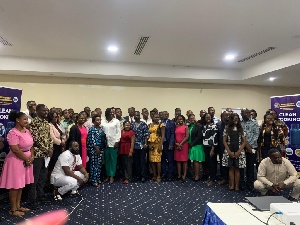- Home - News
- Elections 2024
- News Archive
- Crime & Punishment
- Politics
- Regional
- Editorial
- Health
- Ghanaians Abroad
- Tabloid
- Africa
- Religion
- Photo Archives
- Press Release
General News of Thursday, 27 March 2025
Source: www.ghanawebbers.com
Ghana to develop new Clean Cooking Policy to reduce health risks and promote sustainability
The Ministry of Energy and Green Transition is engaging stakeholders. They are gathering input for a new Clean Cooking Policy and Strategy.
This roadmap aims for universal access to clean cooking. The target is 50% LPG usage by 2030, up from 36.9%.
Doris Duodo leads the Clean Cooking Unit. She highlighted the dangers of firewood and charcoal use. These fuels release harmful smoke that causes serious health issues.
“More than 1,000 people die yearly from smoke inhalation,” she said. “Between 7,000 to 10,000 people die each year due to related health problems.”
Mrs. Duodo noted that clean cooking reduces exposure to pollutants. These pollutants cause lung diseases, eye irritation, and heart issues, especially in women and children.
Improved cooking stoves are promoted to cut charcoal use. They aim to minimize deforestation and eliminate smoke exposure.
To make clean cooking accessible, the government introduced the Cylinder Recirculation Model (CRM). Small cages filled with gas will be placed nearby for easy purchase.
Mrs. Duodo stressed the importance of safety education for LPG users in rural areas.
Dr. Robert Sobagyi is the Deputy Director for Renewable Energy and Green Transition. He pointed out that using firewood and charcoal harms the environment.
“When we don’t practice clean cooking, we harm our health,” he said. “This promotion encourages LPG and electric cooking for better environmental protection.”
He also criticized burning tires in abattoirs, which releases toxic chemicals into the air.
Mr. Sobagyi supports clean cooking to prevent poisonous materials from entering the atmosphere. This helps reduce illnesses and improve life expectancy.
Ghana’s Clean Cooking Initiative addresses respiratory diseases, maternal health risks, deforestation, and air pollution.
With policy implementation and public education, Ghana aims for its 50% LPG target by 2030. This will ensure a healthier and more sustainable future.











